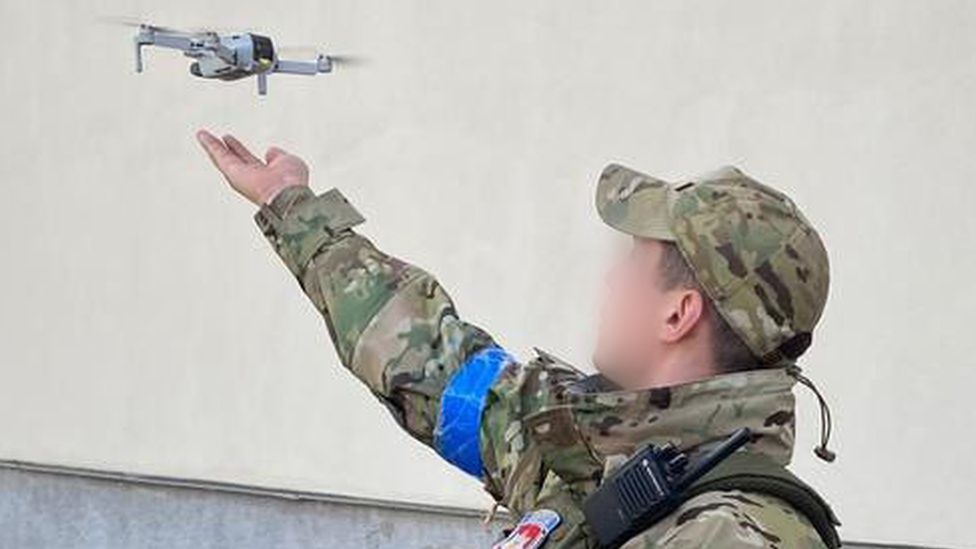ARTICLE AD BOX
By Chris Vallance
Technology reporter
 Image source, DroneUA
Image source, DroneUA
A Ukrainian soldier uses a small consumer drone
Dozens of people have given their hobby and commercial drones to Ukraine after it appealed for "dronations" to help build its "army of drones".
The country is also asking for money to buy 200 military reconnaissance drones.
Ukrainian and Russian forces have both used small consumer drones, also known as unmanned aerial vehicles (UAV).
But Justin Bronk of the Royal Unite Services Institute (RUSI) says while small drones are useful, tactics are adapting to counter them.
Small and commercial drones can provide a live view of the enemy's positions he says.
"Both sides in Ukraine, have been able to very rapidly exploit that real time video picture, to call down artillery fire and quickly correct it so that it's very, very accurate, even when using old school unguided artillery, onto enemy forces," he said.
But he warned electronic countermeasures were becoming increasingly effective.
Drone force
The proposed army of drones is a complex programme involving procurement, maintenance and replacement, as well as pilot training, Ukraine says.
Armed Forces of Ukraine assistant commander-in-chief Col Oleksii Noskov said: "The 'army of drones' will allow us to constantly monitor the 2,470km-long (1,530-mile) front line and to field an effective response to enemy attacks, using modern technology."
Mykhailo Fedorov, Ukraine's minister of digital transformation, told the BBC via email that the first goal of the campaign was to purchase tactical drones which have a 160 km (100 mile) range and are equipped with sophisticated camera, GPS and mapping tools
However after studying the issue he said "our team understood that Ukraine`s army still needed quadcopters," and so he said Ukraine was asking people to "donate their own drones".
Ukraine hopes to collect thousands of multi-use and commercial UAVs.
Drones that meet the minimum standards are being donated to Ukraine via two warehouses, one in Poland and the other in the United States.
Mr Fedorov also wants companies to get involved: "This project is a great opportunity for drone manufacturers to test their equipment in harsh conditions," he wrote.
The campaign which was launched Friday has already raised 200m UAH (£5.7m) enabling the purchase of two military UAVs - and dozens of small drones had been received according to a tweet from Mr Fedorov.
The military "warmate" drones, according to Mr Bronk, are a type of loitering munition manufactured in Poland. According to the company's website the drone "constitutes a good alternative for anti-tank guided missiles".
No buy zone
According to Mr Fedorov, hobby and commercial drones have already shown their effectiveness on the battlefield.
Russia too made use of them.
Earlier this year Mr Fedorov called on market leader DJI to stop selling drones in Russia.
In a significant intervention for a Chinese firm, DJI halted sales in Ukraine and Russia,
"Russia is using hobby/commercial drones to strike and conduct reconnaissance in their unprovoked and unfair war", Mr Fedorov wrote.
"It is crucial that the world's largest commercial drone-maker, DJI, stopped sales in Russia."
Image source, UNITED24
Image caption,Minister of Digital Transformation Mykhailo Fedorov appeals for "dronations"
Valerii Iakovenko, co-founder of Ukrainian company DroneUA, told BBC News that DJI's action had pushed up costs to Ukraine while Russia was still able to continue obtain drones, via Belarus.
His company, mostly farmers by background he said, had been supplying drones and robotics to the government since before the war.
Drones, along with Elon Musk's Starlink satellite internet system and professional radio equipment, were now among the most sought-after technology, he said.
And even small ones were useful mostly providing field data, locating enemy troops and correcting artillery fire.
"A huge number of volunteer operators that joined the Ukrainian forces are also making a difference," Mr Iakovenko said.
"Drone pilots of small consumer drones are providing aerial intelligence along the whole front line.
"It is all about the speed of information exchange between the field and in the general staff, to make decisions almost immediately.
Watch: The volunteers using drones to monitor Russian troops
Raising morale
RUSI airpower and technology expert Mr Bronk says Ukrainians in particular have been very inventive in finding ways to source and then use commercial, as well as military grade drones, "including using them as improvised loitering munitions to strike targets at significant distance, including, recently, an oil refinery in Rostov with a commercial grade UAV with an improvised warhead".
But tactics, he warns, are changing.
"What's happened in the last couple of months in Donbas is that the Russians have managed to concentrate their electronic warfare assets and integrate them well with their with their ongoing operations.
As a result, Mr Bronk says, whenever Ukraine sends up a small UAV using radio remote control "the Russian electronic warfare kit picks it up and immediately either takes it over or just cuts the command link electronically and forces it to return".
To avoid this, instead of being flown by remote control small drones have to be programmed to fly a set route and targets identified when footage is analysed on their return. This slow process is of limited value against moving targets he said.
Mr Bronk felt that what Ukraine needed were loitering munitions capable of targeting and attacking Russian electronic warfare systems.
While hobbyist drones were useful, at the moment "grassroots support in terms of generating military equipment is probably of as much value in terms of morale for the people who are contributing, as well as the people on the front lines".

 2 years ago
46
2 years ago
46








 English (US) ·
English (US) ·